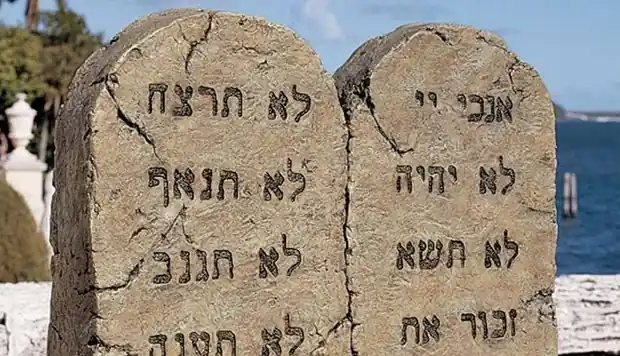When the Pharisees asked Yeshua what the most important commandment was, he responded, “You shall love Hashem your God with all your heart, with all your soul, and with all your mind.”
This week’s Torah portion contains the Ten Commandments, known in Hebrew as עשרת הדיברות, Aseret ha'Dibrot lit. “The Ten Words”. Unlike the rest of Torah, the Ten Words were inscribed on the stone tablets, what the Torah calls לוחות הברית, Lukhot HaBrit, lit. "the tablets of the covenant".
The Aramaic “Dibraya” literally means “the word” of Hashem. In Judaism, the Dibraya are not commonly called the Ten Commandments because there are actually 613 commandments. So, what makes the Dibraya different from all of the other commandments? And why are these Ten Words written on the Lukhot HaBrit and not with other commandments?
When the Pharisees asked Yeshua what the most important commandment was, he responded, “You shall love Hashem your God with all your heart, with all your soul, and with all your mind.” Then Yeshua said, “The second is like it: ‘You shall love your neighbor as yourself’ (Mat. 22:37-39).” Neither of these commandments are contained in the Ten Words. Nevertheless, both are the most important of all the commandments.
Upon further inspection, it becomes apparent that these two commandments are in reality, categories of all the commandments: “On these two commandments hang all the Torah and the Prophets (Mat. 22:40).” Understanding that the two great commandments are actually categories of other commandments gives us insight to understanding the Ten Commandments: Of the Ten Words, the first five are categorical instructions that fulfill the mandate to “love Hashem your God.” The second five words are categories of “love your neighbor as yourself.”
When Yeshua explained these two points to his contemporary, he did so with the understanding that his response conveyed broader concepts:
- “You shall love Hashem your God.” This commandment does not explain how to love Hashem our God. Yeshua simply states that this is the most important of the commandments.
- “You shall love your neighbor as yourself.” This does not explain how we are to love our neighbor as ourselves. Yeshua simply states that this commandment is just as important as the first one.
In the same way, the Ten Words are major headings for all 613 commandments. For example, the commandments concerning Passover fall under the category of Shabbat: “You shall keep my Sabbaths [plural] and reverence my Sanctuary: I am Hashem (Lev. 19:30).” The commandment concerning cities of refuge correspond to the category of “do not murder” (Num. 35:11-24). The commandment of “thou shalt not hold a worker’s wages overnight” (Deut. 24:15), falls into the category of “thou shalt not steal.” Thus, every one of the 613 commandments can be categorized in this manner. Similarly, each of the Ten Words fall into the two categories noted by Yeshua.
In summary, the two commandments of the Ten Words are in truth the 613 commandments. The Ten Words are important because they categorize each one of the 613 commandments so they may be more generally understood. Likewise, Yeshua highlights the two great commandments, and we need the Ten Words to understand the greatest commandments.


